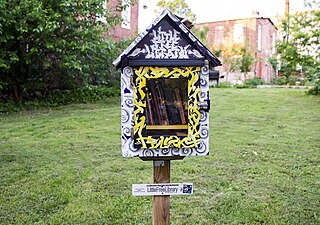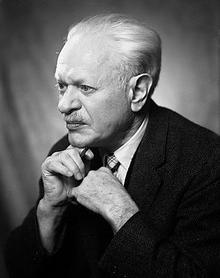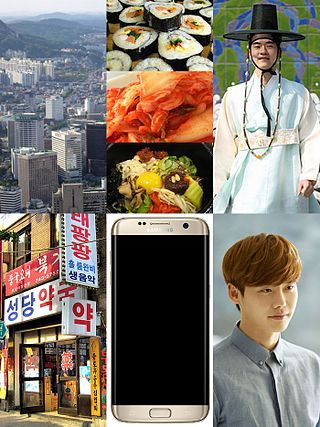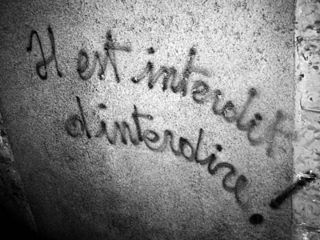
A symbol is a mark, sign, or word that indicates, signifies, or is understood as representing an idea, object, or relationship. Symbols allow people to go beyond what is known or seen by creating linkages between otherwise very different concepts and experiences. All communication is achieved through the use of symbols. Symbols take the form of words, sounds, gestures, ideas, or visual images and are used to convey other ideas and beliefs. For example, a red octagon is a common symbol for "STOP"; on maps, blue lines often represent rivers; and a red rose often symbolizes love and compassion. Numerals are symbols for numbers; letters of an alphabet may be symbols for certain phonemes; and personal names are symbols representing individuals.

The sociology of knowledge is the study of the relationship between human thought, the social context within which it arises, and the effects that prevailing ideas have on societies. It is not a specialized area of sociology. Instead, it deals with broad fundamental questions about the extent and limits of social influences on individuals' lives and the social-cultural basis of our knowledge about the world. The sociology of knowledge has a subclass and a complement. Its subclass is sociology of scientific knowledge. Its complement is the sociology of ignorance.

Social constructionism is a term used in sociology, social ontology, and communication theory. The term can serve somewhat different functions in each field; however, the foundation of this theoretical framework suggests various facets of social reality—such as concepts, beliefs, norms, and values—are formed through continuous interactions and negotiations among society's members, rather than empirical observation of physical reality. The theory of social constructionism posits that much of what individuals perceive as 'reality' is actually the outcome of a dynamic process of construction influenced by social conventions and structures.

Symbolic interactionism is a sociological theory that develops from practical considerations and alludes to humans' particular use of shared language to create common symbols and meanings, for use in both intra- and interpersonal communication. According to Macionis, symbolic interactionism is "a framework for building theory that sees society as the product of everyday interactions of individuals". In other words, it is a frame of reference to better understand how individuals interact with one another to create symbolic worlds, and in return, how these worlds shape individual behaviors. It is a framework that helps understand how society is preserved and created through repeated interactions between individuals. The interpretation process that occurs between interactions helps create and recreate meaning. It is the shared understanding and interpretations of meaning that affect the interaction between individuals. Individuals act on the premise of a shared understanding of meaning within their social context. Thus, interaction and behavior is framed through the shared meaning that objects and concepts have attached to them. From this view, people live in both natural and symbolic environments.
Hyperreality is a concept in post-structuralism that refers to the process of the evolution of notions of reality, leading to a cultural state of confusion between signs and symbols invented to stand in for reality, and direct perceptions of consensus reality. Hyperreality is seen as a condition in which, because of the compression of perceptions of reality in culture and media, what is generally regarded as real and what is understood as fiction are seamlessly blended together in experiences so that there is no longer any clear distinction between where one ends and the other begins.

Peter Ludwig Berger was an Austrian-born American sociologist and Protestant theologian. Berger became known for his work in the sociology of knowledge, the sociology of religion, study of modernization, and theoretical contributions to sociological theory.

Kenneth Duva Burke was an American literary theorist, as well as poet, essayist, and novelist, who wrote on 20th-century philosophy, aesthetics, criticism, and rhetorical theory. As a literary theorist, Burke was best known for his analyses based on the nature of knowledge. Further, he was one of the first individuals to stray from more traditional rhetoric and view literature as "symbolic action."
Media democracy is a democratic approach to media studies that advocates for the reform of mass media to strengthen public service broadcasting and develop participation in alternative media and citizen journalism in order to create a mass media system that informs and empowers all members of society and enhances democratic values.
In media studies, mass communication, media psychology, communication theory, and sociology, media influence and themedia effect are topics relating to mass media and media culture's effects on individuals' or audiences' thoughts, attitudes, and behaviors. Through written, televised, or spoken channels, mass media reach large audiences. Mass media's role in shaping modern culture is a central issue for the study of culture.

Lifeworld may be conceived as a universe of what is self-evident or given, a world that subjects may experience together. The concept was popularized by Edmund Husserl, who emphasized its role as the ground of all knowledge in lived experience. It has its origin in biology and cultural Protestantism.

The sociology of culture, and the related cultural sociology, concerns the systematic analysis of culture, usually understood as the ensemble of symbolic codes used by a member of a society, as it is manifested in the society. For Georg Simmel, culture referred to "the cultivation of individuals through the agency of external forms which have been objectified in the course of history". Culture in the sociological field is analyzed as the ways of thinking and describing, acting, and the material objects that together shape a group of people's way of life.

Sociology of terrorism is a field of sociology that seeks to understand terrorism as a social phenomenon. The field defines terrorism, studies why it occurs and evaluates its impacts on society. The sociology of terrorism draws from the fields of political science, history, economics and psychology. The sociology of terrorism differs from critical terrorism studies, emphasizing the social conditions that enable terrorism. It also studies how individuals as well as states respond to such events.

Dramatism, a communication studies theory, was developed by Kenneth Burke as a tool for analyzing human relationships through the use of language. Burke viewed dramatism from the lens of logology, which studies how people's ways of speaking shape their attitudes towards the world. According to this theory, the world is a stage where all the people present are actors and their actions parallel a drama. Burke then correlates dramatism with motivation, saying that people are "motivated" to behave in response to certain situations, similar to how actors in a play are motivated to behave or function. Burke discusses two important ideas – that life is drama, and the ultimate motive of rhetoric is the purging of guilt. Burke recognized guilt as the base of human emotions and motivations for action. As cited in "A Note on Burke on "Motive"", the author recognized the importance of "motive" in Burke's work. In "Kenneth Burke's concept of motives in rhetorical theory", the authors mentioned that Burke believes that guilt, "combined with other constructs, describes the totality of the compelling force within an event which explains why the event took place."

The spectacle is a central notion in the Situationist theory, developed by Guy Debord in his 1967 book The Society of the Spectacle. In the general sense, the spectacle refers to "the autocratic reign of the market economy which had acceded to an irresponsible sovereignty, and the totality of new techniques of government which accompanied this reign." It also exists in a more limited sense, where spectacle means the mass media, which are "its most glaring superficial manifestation."

Deviance or the sociology of deviance explores the actions and/or behaviors that violate social norms across formally enacted rules as well as informal violations of social norms. Although deviance may have a negative connotation, the violation of social norms is not always a negative action; positive deviation exists in some situations. Although a norm is violated, a behavior can still be classified as positive or acceptable.
The social construction of gender is a theory in the humanities and social sciences about the manifestation of cultural origins, mechanisms, and corollaries of gender perception and expression in the context of interpersonal and group social interaction. Specifically, the social construction of gender theory stipulates that gender roles are an achieved "status" in a social environment, which implicitly and explicitly categorize people and therefore motivate social behaviors.
Constitutive criminology is an affirmative, postmodernist-influenced theory of criminology posited by Stuart Henry and Dragan Milovanovic in Constitutive criminology: beyond postmodernism (1996), which was itself inspired by Anthony Giddens' The Constitution of Society (1984), where Giddens outlined his theory of structuration. In this theory, crime is conceived as an integral part of the overall production of society and is a co-production of human agents and the cultural and social structures they continuously create. This theory defines crime as the harm resulting from humans investing energy in relations of power that denies or diminishes those subject to this investment, their own humanity. From the perspective of constitutive theory, a criminal is viewed as an "excessive investor" while the victim is known as a "recovering subject".

Rey Chow is a cultural critic, specializing in 20th-century Chinese fiction and film and postcolonial theory. Educated in Hong Kong and the United States, she has taught at several major American universities, including Brown University. Chow is currently Anne Firor Scott Professor of Literature in Trinity College of Arts and Sciences at Duke University.
Text and conversation is a theory in the field of organizational communication illustrating how communication makes up an organization. In the theory's simplest explanation, an organization is created and defined by communication. Communication "is" the organization and the organization exists because communication takes place. The theory is built on the notion, an organization is not seen as a physical unit holding communication. Text and conversation theory puts communication processes at the heart of organizational communication and postulates, an organization doesn't contain communication as a "causal influence", but is formed by the communication within. This theory is not intended for direct application, but rather to explain how communication exists. The theory provides a framework for better understanding organizational communication.
In cultural studies, media culture refers to the current Western capitalist society that emerged and developed from the 20th century, under the influence of mass media. The term alludes to the overall impact and intellectual guidance exerted by the media, not only on public opinion but also on tastes and values.











